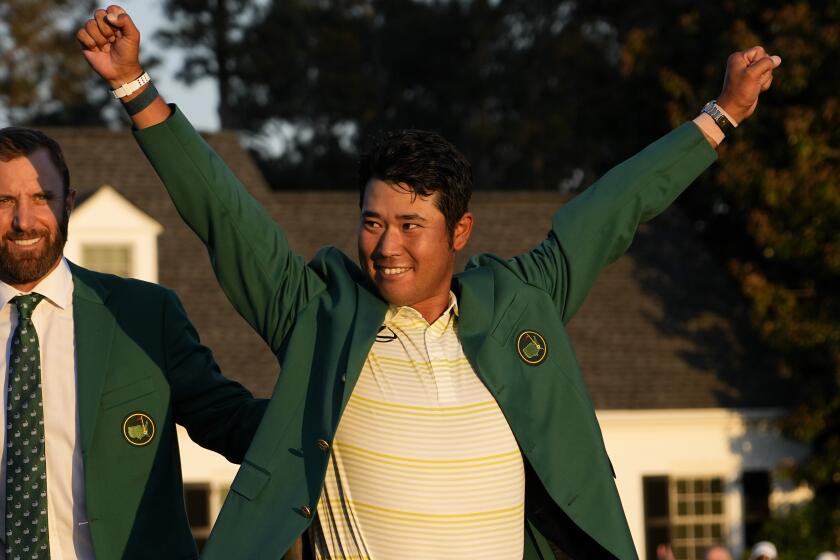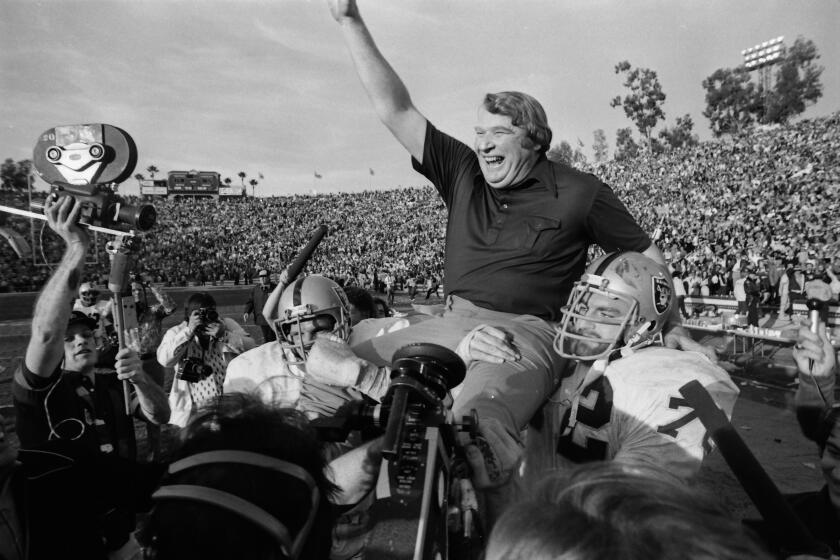Xander Schauffele misses another chance for major glory at Masters

- Share via
AUGUSTA, Ga. — Xander Schauffele watched the ball sail off his club into the evening twilight, then glanced at the 16th green, then back up at the ball, then back down at the green, calculating the trajectory and distance and descent angle.
It was 184 yards to the traditional Sunday back left pin position. He hits his 8-iron 180. He and his caddie judged the wind to be blowing off the left from behind them, which would add the extra 4 yards. He trailed Japan’s Hideki Matsuyama by only two strokes with three holes to play, charging, birdies on four straight holes, roar after roar undulating across Augusta National’s fairways like ocean waves.
“I hit the perfect shot,” Schauffele said later. “I flushed it.”
The ball was coming down now, and he locked his eyes just right of the flag. Except it didn’t land there. It landed a few yards short, turned left and slid down the bank into the murky water of the hole named “Redbud.”
Schauffele dropped his head and nodded twice, then shrugged.
Again.
He would make a six at the par-3 16th, his first triple bogey in 1,042 career holes at major championships, and end his exhilarating run on the back nine on Sunday at the Masters. And continue his excruciating run of close calls at majors.
Hideki Matsuyama becomes the first Japanese man to win one of golf’s majors, finishing at 10-under par to take the 2021 Masters tournament title.
Matsuyama, his playing partner Sunday, left the scorer’s room after signing their cards and turned left toward Butler Cabin, where 2020 champion Dustin Johnson slipped a 42 Long green jacket onto shoulders that carried the hopes and expectations of an entire nation.
Schauffele turned right toward the parking lot, like the other 87 golfers in the field.
“Golf,” he said earlier in the week, “consists of a bunch of losers, unfortunately. There’s only one guy that wins every week. That’s how sports works.”
We live in a culture obsessed with winning, and at age 27 the kid from San Diego finds himself uncomfortably wedged in the attic, just below the roof. Good but not great. Contender but not champion. Terrific but no trophy.
He has played in 15 major championships since joining the PGA Tour in 2017. Finished in the top 10 in eight of them, the most by anyone in their first 15 majors since all four tournaments became stroke-play events in 1958. He’s had top-fives in six of them, top-threes in four of them.
He’s won none of them.
He finished tied for fifth in his first major, the 2017 U.S. Open. He shared the lead after 54 holes at the 2018 Open Championship in Scotland and finished second, two strokes behind Francesco Molinari. He found himself leading the Masters in 2019 after 68 holes before failing to birdie the par-5 15th and finishing tied for second in what he describes as “a rookie hiccup moment of, ‘Oh, my goodness, I’m leading the Masters.’”
He’s had three other top six finishes at the last three U.S. Opens. He tied for 10th at the PGA Championship last August.
He entered Sunday four strokes behind and quickly narrowed it to three after Matsuyama nervously sliced his opening drive into the trees and bogeyed. But a nightmarish sequence cost him four strokes in three holes, and he found himself seven back as they made the turn.
But you know the saying: The Masters doesn’t start until the back nine on Sunday.
And it didn’t. Birdies at 12, 13, 14 and 15 (and nearly two eagles) left Schauffele two back as they walked to the 16th tee.

How Hideki Matsuyama won the 2021 Masters.
He and caddie Austin Kaiser, his former teammate at San Diego State, looked up at the trees surrounding the hole and determined the wind direction. Schauffele picked an 8-iron out of his bag and swung, flickering his eyes up and down.
The wind shifted. It was blowing into them now.
“It got smoked and eaten up,” Schauffele said. “You could kind of see it. The ball hovered there.”
After a penalty stroke, Schauffele hit a 9-iron from the front of the tee box and watched it sail over the back of the green, under a spectator’s chair.
“That’s what happens here, right?” said Stefan Schauffele, his father and coach, watching from the back of the green. “Within two minutes, the wind was different. That happens all the time here. The tricky part is to accept it.”
Xander Schauffele spoke earlier in the week about trusting the “process,” about “putting myself in position with nine holes to go and learning from each and every mistake and also the things I did well in those moments,” about putting those experiences “in the memory bank” for next time.
It’s a fair question: At what point does process become predicament?
Most media outlets say he has eight second-place finishes since his last PGA Tour win in 2017 (and would have been nine had Will Zalatoris not slipped ahead of him Sunday over the closing holes). That includes the Tour Championship last August, when Schauffele had the lowest four-round score but technically finished second because that event uses a weighted format based on FedEx points and Johnson started seven strokes ahead of him.
Before golfers could bring their own staff to the Masters, Black caddies in August, Ga., played key roles supporting the green jacket winners.
“I count that as a win,” Stefan said. “That’s just you guys (in the media) being bored and not sharpening your pencils. It really doesn’t matter to us, and it really doesn’t matter to him, either. He wants to win. But second place is a semi-success, meaning statistically, eventually, there will be first places instead of second places. It’s just the way it works.
“I think he can hold his head high. He made a run, hit the ball well, almost got it. It’s all positive.”
Maybe, indeed, it was a cruel, capricious puff of wind from the golf gods at an inopportune time. Or maybe it’s something deeper in his psyche that emerges on Sunday afternoons.
Mystique or mistake?
He’s only 27. The jury is still deliberating.
“If you look at my career, you could call it a big ball of scar tissue with a bunch of second places,” Schauffele told CBS. “I don’t look at it that way. I don’t think my team looks at it that way. … You know, I hit a good shot, I committed to it, it turned out bad. I’ll be able to sleep tonight.
“I might be tossing and turning, but I’ll be OK.”
More to Read
Go beyond the scoreboard
Get the latest on L.A.'s teams in the daily Sports Report newsletter.
You may occasionally receive promotional content from the Los Angeles Times.











